
Surprisingly, mental stress can and will affect your bodily health. What consumes your mind, controls your life. Lets look at exactly how stress negatively impacts your wellness.
Stressors Activate Dangerous Hormones
- Extra cortisol can produce glucagon and decrease insulin production which increases your blood sugar and can lead to diabetes and obesity.
- It can alter your behavior by suppressing hormones and increasing inflammation. Increased inflammation within your body can also suppress your immune system which leads to illness (some auto-immune diseases).
- Cortisol can produce renin as well, which increases blood pressure.
- Epinephrine Norepinephrine (another harmful hormone) leads to high blood pressure. How? It increases your heart rate and increases blood viscosity which in turn, increases clotting. Stress can also be an underlying cause of heart disease.
The Pain/Fatigue Cycle
Stress and anxiety can lead to many things, and becomes a vicious cycle. Stress causes difficult and toxic emotions (such as hopelessness, anger, fear, resentment) which can initiate depression. Depression can lead to medication problems and then disease. Disease results in tense muscles and/or other bodily pains, which can then lead to poor sleep/insomnia. And lack of sleep can bring more stress and anxiety into your life.
It is important to realize just how much hurt can result from excessive stress. So, the most important thing to do is find ways to cope with your anxieties so they don’t cause future health problems.
Read our “Coping With Stress” blog for some tips to remember.


